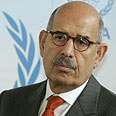
ElBaradei: Iran on way to atomic bomb capability
UN nuclear watchdog director says Islamic republic 'has the cookbook… but right now they don't yet have the ingredients - enough nuclear material to make a bomb overnight.' Meanwhile, six powers agree on draft resolution against Tehran atomic plans
Also Friday, German and French officials said six world powers, including the United States and Russia, agreed on a draft resolution on Iran's nuclear program.
Neither official commented on the contents of the resolution, although other diplomatic sources said it did not contain new sanctions against Tehran for refusing to suspend sensitive nuclear enrichment work.
Iran says its uranium - enrichment program is only for civilian purposes – electricity generation – but is under IAEA investigation and UN sanctions over past undeclared activity and failure to prove its intentions are wholly peaceful.
ElBaradei said having nuclear arms unfortunately still symbolized prestige and power, tempting nations with security worries to at least develop the potential for a bomb through the "dual use" enrichment process.
Beyond seven confirmed nuclear weapons powers, there is a wide range of countries with access to components - fissile material or the equipment to produce it - that could give them an atomic bomb "in a matter of months or a year", he said.
Asked by the Sueddeutsche Zeitung daily if Iran was also on its way to "virtual" nuclear-weapons power status, he said: "That is correct." But he added Tehran could not "break out" to a bomb as long IAEA monitors remained at its nuclear sites.
Iran has pledged to maintain regular IAEA inspections, but these are limited to a few declared facilities.
Nuclear 'cookbook'
"They have the cookbook ... (But) right now they don't yet have the ingredients -- enough nuclear material to make a bomb overnight," ElBaradei said. He did not spell out how long Iran might need to reach that threshold, if indeed that was its goal. Some Western analysts say this could come within two years.
"The hope is that as long as (such countries) remain in the NPT (Non-Proliferation Treaty) with IAEA inspectors keeping watch, the likelihood is slim (they) would risk international isolation if they quit the treaty," ElBaradei said.
There has been talk in the United States and Israel, Iran's arch-enemies, of last resort military action against Iranian nuclear sites although each remains formally committed to a diplomatic solution.
ElBaradei said the military option would be disastrous. The Iranian issue could not be resolved unless Washington dropped its refusal to negotiate with Tehran directly and without preconditions.
"The Iranian issue at its heart is really a question of security...The nuclear (part) is a symptom of an underlying sense of insecurity or a desire to be recognized as a major, regional power," ElBaradei told Sueddeutsche Zeitung.
"Europe is not really in the front seat (here). It is the US who is in the front seat. The earlier that you have a direct negotiation between the US and Iran, the earlier the prospect that we will have a solution," he said.
A settlement would have to address security issues across the region including the Israeli-Palestinian peace process and "the elephant in the room" -- Israel's undeclared nuclear arsenal, said ElBaradei.
"A military solution ... will give (Iran's) regime the full (domestic) support, the full justification to go for a crash course to develop nuclear weapons. The know-how is there, you cannot take it out of their minds.
"They will simply, in my view, go underground. The region is already in an unsustainable situation and adding an attack will simply create a ball of fire which will ricochet everywhere, in every part of the world," he said.
Russia: No need for new sanctions
British Foreign Secretary David Miliband told reporters the six powers would submit the draft resolution text to the 15-nation UN Security Council for discussions on Friday. It was unclear when the council would vote on the text but one European official said that could happen during the weekend.
The United States, Britain, France and Germany wanted to ratchet up sanctions on Iran, which has refused to halt its nuclear enrichment work. China and especially Russia oppose further sanctions.
"We will be presenting a short resolution for consultations today that reaffirms existing resolutions that are on the UN books, ... (and) reaffirms the unity of the (six powers)," Miliband said in words confirmed by French Foreign Minister Bernard Kouchner.
Miliband made clear the resolution did not include new sanctions against Iran for refusing to suspend its nuclear program as demanded in four previous council resolutions.
The six powers and the council, Miliband said, were determined to press ahead with "further discussions and further steps" on Iran's nuclear program, which Western countries fear is aimed at developing atomic weapons.
Friday's meeting of ministers of the six powers had originally been scheduled for Thursday but was canceled after Russia decided to withdraw to protest US criticism of its invasion of Georgia last month.
Miliband said the the UN nuclear watchdog based in Vienna had failed to get sufficient cooperation from Tehran in its investigation of allegations that Iran conducted research on an atomic weapon.
"So we will be taking the consequent next steps in our discussions bilaterally and multilaterally," he said.
Senior foreign ministry officials from the six powers would be meeting again to discuss the next steps. There will also be bilateral meetings of key players.
Russia's UN ambassador Vitaly Churkin said this week Moscow saw no need for a further round of sanctions now.
In June the six powers gave Iran a beefed-up offer of political and economic incentives, including nuclear reactors, in exchange for a suspension of its enrichment program. Tehran says enrichment is a sovereign right it will never renounce.
Churkin said Moscow would like Tehran to have a chance to thoroughly study the offer.










